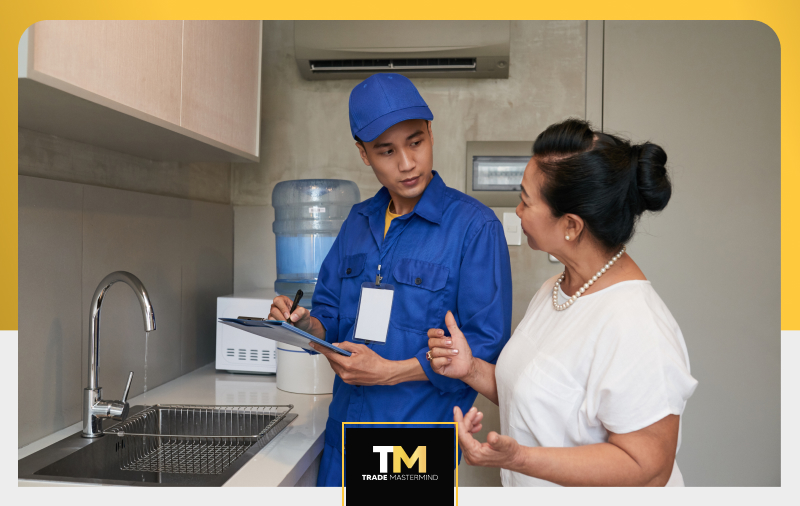Heating, ventilation, and air conditioning (HVAC) services are essential components of modern living and working environments. With climate change increasing demand for efficient and sustainable heating and cooling, there has never been a better time to enter this thriving sector. If you’re exploring how to start a heating and air conditioning business in the UK, this comprehensive guide breaks down every step you need to launch successfully.
[divi_library_layout id=”16468″]
From understanding market potential to legal requirements, financing, marketing, and growth strategies, this detailed guide from Trade Mastermind (trademastermind.co.uk) provides expert insights and real-world tips tailored to the UK trades climate.
Understanding the UK HVAC Market Landscape
The UK HVAC industry continues to grow strongly amid heightened awareness of energy use and environmental impact. Some key facts about the market:
- 80% of UK homes still rely on gas boilers, many needing replacement or upgrade in coming years.
- The HVAC market was valued at nearly £3 billion in 2025, with growth fueled by retrofitting, green alternatives like heat pumps, and smart building controls.
- Increasing regulations around energy efficiency and emissions push residential and commercial clients to upgrade HVAC systems.
- Residents, landlords, businesses, and developers all require reliable HVAC services, creating diverse customer segments and revenue opportunities.
Identifying your niche market early, residential repairs, commercial installations, or renewable energy HVAC, will streamline your planning and marketing efforts.
Step 1: Acquire the Necessary Skills and Certification
Before launching your business, obtaining relevant qualifications and licenses is essential for compliance and credibility:
- Gain an NVQ Level 2 or 3 in Heating, Ventilation, or Refrigeration via recognised trade colleges or apprenticeship routes.
- Register with the Gas Safe Register if you’ll work on gas appliances — legally mandatory for anyone servicing gas boilers or heating systems.
- Consider certifications in refrigeration or electrical work depending on your specialisation.
- Gain experience working alongside established HVAC companies to build practical skills and confidence.
Certifications and experience boost your credibility with clients and open access to higher-value contracts.
Step 2: Create a Solid Business Plan
A strong business plan forms the foundation of your business. It should include:
- Executive Summary: Vision, mission, and unique value proposition.
- Market Research: Define your customer segments, competitor analysis, and market demand in your service area.
- Services Offered: Installation, repair, maintenance, consultancy, or specialised systems.
- Pricing Model: How you’ll price hourly or fixed-rate contracts; consider maintenance packages.
- Startup Costs & Funding: Breakdown of vehicle, tools, insurance, marketing, and premises costs, along with funding strategies.
- Operations & Staffing: How many technicians you’ll employ, equipment management, and workflow processes.
- Marketing Plan: Website, local SEO, referrals, and social media marketing.
- Growth Strategy: Scale plans, partnerships, or diversification.
A clear plan helps you manage resources wisely and attracts support from lenders or investors.
Step 3: Register Your Business and Handle Legal Requirements
- Choose your business structure: sole trader, partnership, or limited company. Limited companies offer liability protection but require extra admin like Companies House filings.
- Register the business with HM Revenue & Customs for tax purposes.
- Secure relevant insurance, including public liability, employers’ liability (if hiring), and vehicle insurance.
- Get the right licenses, including Gas Safe registration if applicable.
- Review health & safety regulations and environmental compliance applying to your operations.
Legal compliance isn’t just mandatory — it’s part of building client trust and avoiding costly penalties.
Step 4: Budget Startup and Running Costs Wisely
Most new UK HVAC businesses spend between £8,000 and £15,000 on startup costs, including:
- Reliable vehicle (£5,000-£8,000 for quality used vans)
- Essential tools and equipment (£2,000 – £3,500) such as digital gauges, leak detectors, PPE
- Certifications and Gas Safe registration (£400-£1,200)
- Insurance (£500-£1,500 annually)
- Marketing and branding (£300-£800 for website, cards, flyers)
Ongoing costs include fuel, vehicle maintenance, insurance renewals, marketing, subscriptions for software, and staff wages.
Step 5: Acquire High-Quality Tools and Technology
The right tools are essential for quality, efficiency, and client satisfaction:
- Start with multi-purpose hand tools and digital diagnostic devices.
- Invest in technology for job scheduling, invoicing, and customer relationship management (CRM) to streamline operations.
- Equip your vehicle with organised storage for easy access on-site.
Technology-backed efficiencies and well-maintained tools enhance professionalism and productivity.
Step 6: Position Your HVAC Business with Strong Marketing
Building an effective marketing strategy tailored to local UK HVAC demand is key to attracting clients:
- Develop a professional, mobile-friendly website optimised for local keywords such as “heating services London” or “air conditioning repair Manchester.”
- Claim and maintain your Google Business Profile with accurate info, photos, and client reviews.
- Use SEO best practices on your website; regularly update with blogs, FAQs, and case studies.
- Engage on social media platforms sharing educational tips, project photos, and customer testimonials.
- Network with estate agents, property managers, and local businesses for referrals.
- Consider paid advertising (Google Ads or Facebook) targeted at local homeowners or businesses.
Trade Mastermind offers coaching and resources to help HVAC startups build and execute marketing plans that deliver leads consistently.
Step 7: Hire, Train, and Retain Skilled Technicians
Growth means assembling a reliable team:
- Source qualified apprentices or technicians with the right certifications.
- Invest in continuous training to stay current on new HVAC technologies and regulatory requirements.
- Promote a positive working culture to reduce turnover, ensuring stable client relationships and business continuity.
Step 8: Ensure Customer Service Excellence and Compliance
Clients expect professionalism, punctuality, clear communication, and guarantees on work done:
- Set clear expectations about timelines, costs, and warranties.
- Provide post-service support and maintenance plans.
- Adhere strictly to UK health and safety standards and environmental guidelines.
Excellence in service drives referrals and repeat business, fundamental for long-term success.
Step 9: Monitor Finances and Plan for Growth
- Use accounting software and financial dashboards to maintain control over cash flow, expenses, and invoicing.
- Review pricing regularly to maintain healthy margins.
- Explore expansion options such as adding renewable energy services or moving into commercial contracts.
Making data-driven decisions and reinvesting profits smartly accelerates your HVAC business growth.
Conclusion
Knowing how to start a heating and air conditioning business in the UK means balancing hands-on technical skills with savvy business planning, compliance, and marketing. This industry offers strong growth opportunities, especially as energy efficiency and air quality become priorities. By following these practical steps, you can launch a resilient HVAC business prepared to meet evolving customer needs and regulatory demands.








